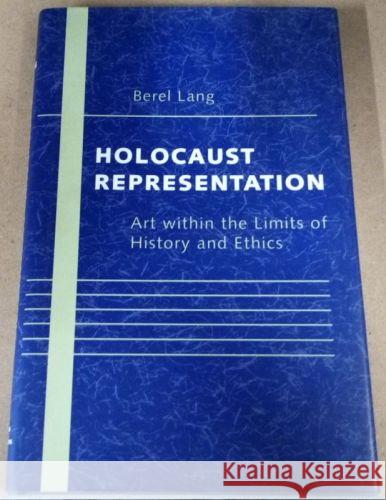Holocaust Representation: Art Within the Limits of History and Ethics - stan bdb 9780801864155 » książka
Holocaust Representation: Art Within the Limits of History and Ethics - stan bdb 9780801864155
ISBN-13: A780801864155 / Angielski / Twarda / 2000 / 192 str.
Holocaust Representation: Art Within the Limits of History and Ethics - stan bdb 9780801864155
ISBN-13: A780801864155 / Angielski / Twarda / 2000 / 192 str.
(netto: 80,80 VAT: 5%)
Rabat: -60%
Najniższa cena z 30 dni: 212,10
ok. 1-3 dni roboczych
Darmowa dostawa!
Stan bardzo dobry - książka była czytana, ale jeszcze długo posłuży innym czytelnikom. Ma ślady używania - otwierania i kartkowania, rysy, zabrudzenia. Wygląda jak książka, którą wypożyczasz w bibliotece.Since Theodor Adorno's attack on the writing of poetry -after Auschwitz, - artists and theorists have faced the problem of reconciling the moral enormity of the Nazi genocide with the artist's search for creative freedom. In Holocaust Representation, Berel Lang addresses the relation between ethics and art in the context of contemporary discussions of the Holocaust. Are certain aesthetic means or genres -out of bounds- for the Holocaust? To what extent should artists be constrained by the -actuality- of history--and is the Holocaust unique in raising these problems of representation?The dynamics between artistic form and content generally hold even more intensely, Lang argues, when art's subject has the moral weight of an event like the Holocaust. As authors reach beyond the standard conventions for more adequate means of representation, Holocaust writings frequently display a blurring of genres. The same impulse manifests itself in repeated claims of historical as well as artistic authenticity. Informing Lang's discussion are the recent conflicts about the truth-status of Benjamin Wilkomirski's -memoir- Fragments and the comic fantasy of Roberto Benigni's film Life Is Beautiful. Lang views Holocaust representation as limited by a combination of ethical and historical constraints. As art that violates such constraints often lapses into sentimentality or melodrama, cliche or kitsch, this becomes all the more objectionable when its subject is moral enormity. At an extreme, all Holocaust representation must face the test of whether its referent would not be more authentically expressed by silence--that is, by the absence of representation.











